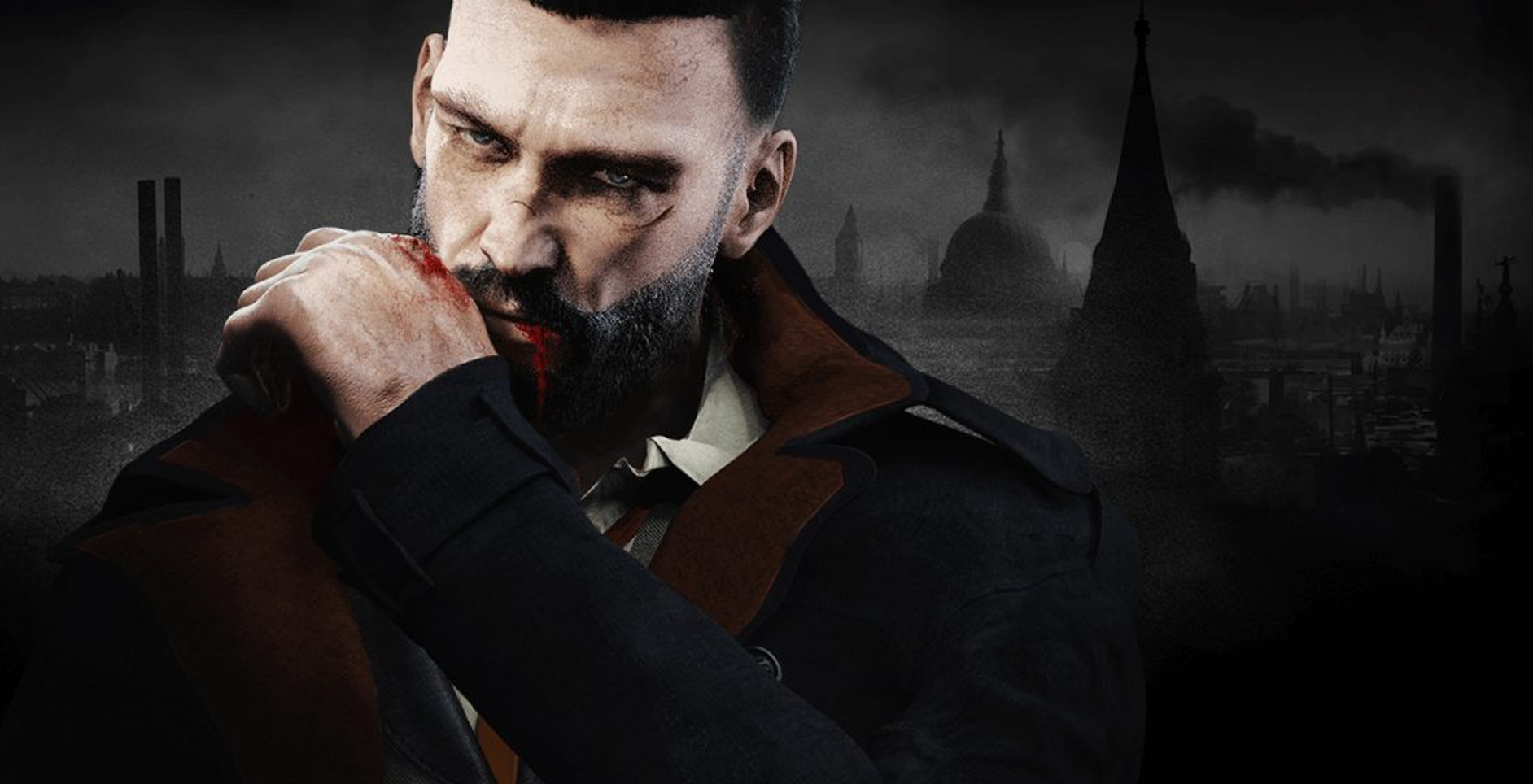Vampyr sees you taking on the role of Jonathan Reid in the year 1918. Reid is a doctor renowned for his work with blood transfusions who previously worked as a combat medic in the war. On a visit to London to visit his ailing mother, he is murdered and thrown into a mass grave. That same night, he awakens and discovers that not only is he a vampire now, but that his thirst for blood is insatiable. Following a bit of a tragic twist in the opening moments, Jonathan sets out to find out who made him into a vampire and discovers a scheme to thwart in the process too.
Vampyr is probably DONTNOD’s most ambitious game yet, allowing the player to explore a semi-open world of London. Separated into districts, the streets have been ravaged by the Spanish Flu pandemic. In short: it’s dilapidated, it’s depressing and everyone’s morale in London is at an all time low. Jonathan can further his own investigation, stopping into hideouts along the way to craft medicines for his patients or weapons and items for himself; or he can tend to other people’s problems. Jonathan can carry out investigations for the people he meets in London, though they aren’t ever more than collecting an item and returning it or speaking to someone and convincing them of something. Despite this, many of these side quests commonly feature a split where Jonathan must make a choice that’ll impact the life of someone in the game. These decisions are almost always straightforward but drawing from the developer’s pedigree (ie. Life Is Strange, Remember Me) these choices feel like they have real weight and consequence.
Jonathan can carry out investigations for the people he meets in London, though they aren’t ever more than collecting an item and returning it or speaking to someone and convincing them of something. Despite this, many of these side quests commonly feature a split where Jonathan must make a choice that’ll impact the life of someone in the game. These decisions are almost always straightforward but drawing from the developer’s pedigree (ie. Life Is Strange, Remember Me) these choices feel like they have real weight and consequence.
The biggest choices you can make in Vampyr are in who you’ll consume to better improve Dr Reid and his powers. Every character you meet in Vampyr has their own (well developed) story as well as social circles that influences who they interact with. Helping them out, curing them of their ailments or getting to know them better improves the quality of their blood. Whenever you want, you can take the life of these citizens and absorb experience points, with the people you’ve spent time helping to yield more experience than the people you just met. The game cleverly gates off these people with an arbitrary level so that you don’t just kill everyone straight away and stop the plot from progressing, but there are very real consequences to who you choose to murder. Killing a “pillar” of one of the districts will make it harder to manage, as people will get sick quicker and be less cooperative, making it harder to maximise your experience gains. On a smaller scale, killing the lover of another character may significantly alter how the widowed character interacts with Jonathan from that point on, locking off further bonding with that character.
The game cleverly gates off these people with an arbitrary level so that you don’t just kill everyone straight away and stop the plot from progressing, but there are very real consequences to who you choose to murder. Killing a “pillar” of one of the districts will make it harder to manage, as people will get sick quicker and be less cooperative, making it harder to maximise your experience gains. On a smaller scale, killing the lover of another character may significantly alter how the widowed character interacts with Jonathan from that point on, locking off further bonding with that character.
Sometimes I’d let my short temper get the best of me and murder someone who gave me attitude without getting to know them better. Other times I’d justify my actions because the person I’d just killed had no family anyway and would not be missed. The fact that I even had these thoughts to myself, to me, makes Vampyr a success. The idea of having to get to know somebody to get the most experience out of them before you kill them is without a doubt the greatest way to induce guilt in any player after they’ve killed someone they’ve spent hours getting to know. For those who can’t bear the guilt, the game is more than playable without killing people. Jonathan will still earn experience for everything he does in the game, whether it be a solved investigation or completion of a story chapter, but never in the amounts that a dead citizen will give. I’d be lying if I didn’t mention that I started with the intention of killing nobody but eventually succumbed to the desire so that I could get experience quicker to better myself in the games combat.
For those who can’t bear the guilt, the game is more than playable without killing people. Jonathan will still earn experience for everything he does in the game, whether it be a solved investigation or completion of a story chapter, but never in the amounts that a dead citizen will give. I’d be lying if I didn’t mention that I started with the intention of killing nobody but eventually succumbed to the desire so that I could get experience quicker to better myself in the games combat.
At first, I was surprised at how fun the combat was in Vampyr. Jonathan can dart around an arena with a cool looking shadow evade and has a huge selection of moves that he can call upon to deal damage. Combat has a nice flow to it; one button deals damage while another deals stun damage. Depleting the enemy’s stun bar lets you suck their blood (think of this as like MP in any other game) which can then be used to conjure up all kinds of magic attacks. Fashioning spears out of blood, boiling the blood of your enemy or even using blood to heal yourself are just some of the things Jonathan can do in battle. As the game progresses, however, the combat does tend to get in the way of the story quite a bit. I can’t count how many times I chose to just run past a battle rather than engaged in it during later parts of the story. The combat isn’t that bad, hell, it’s better than it has any right to be, but it just doesn’t stay as interesting at the end of the game as it was at the beginning. New enemies are introduced, but the flow of combat rarely changes itself up and you’ll find yourself relying on the same powers over and over.
As the game progresses, however, the combat does tend to get in the way of the story quite a bit. I can’t count how many times I chose to just run past a battle rather than engaged in it during later parts of the story. The combat isn’t that bad, hell, it’s better than it has any right to be, but it just doesn’t stay as interesting at the end of the game as it was at the beginning. New enemies are introduced, but the flow of combat rarely changes itself up and you’ll find yourself relying on the same powers over and over.
This is the biggest issue I had with Vampyr. It starts off strong but fails to carry the momentum across its lengthy twenty or so hour storyline. Perhaps it was because I was wanting to see everything on my first playthrough, which did get admittedly tedious, but it just felt like things weren’t happening regularly enough to pique my interest in Jonathan’s main investigation. Some choices I made seemed small but also had huge consequences too, which took the wind out of my sails at key points as well, as there’s no way to backtrack over any choices you’ve made. This is a purpose design choice, and I appreciate it, but I wish the game telegraphed the consequences of the choices you’d make a little bit more than it does. One thing about Vampyr is certain though, and that’s the fact that the game is so great at selling the mood and atmosphere of a flu stricken 1918 London. You’ll be mostly seeing it at night, obviously, but having the moody street lights cutting through an ominous fog gives the game a grim feeling; an authentically Gothic flavour. All the characters themselves aren’t as detailed as the best games you’ve played this year, but they are good looking enough to sell you their story believably. Visually, Vampyr is a little bit rough around the edges, but the strong art direction, moving soundtrack and potent atmosphere more than make up for it.
One thing about Vampyr is certain though, and that’s the fact that the game is so great at selling the mood and atmosphere of a flu stricken 1918 London. You’ll be mostly seeing it at night, obviously, but having the moody street lights cutting through an ominous fog gives the game a grim feeling; an authentically Gothic flavour. All the characters themselves aren’t as detailed as the best games you’ve played this year, but they are good looking enough to sell you their story believably. Visually, Vampyr is a little bit rough around the edges, but the strong art direction, moving soundtrack and potent atmosphere more than make up for it.



